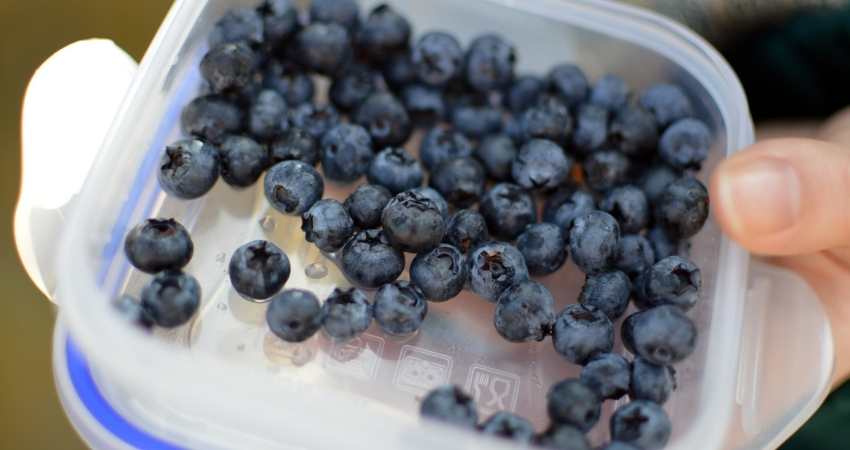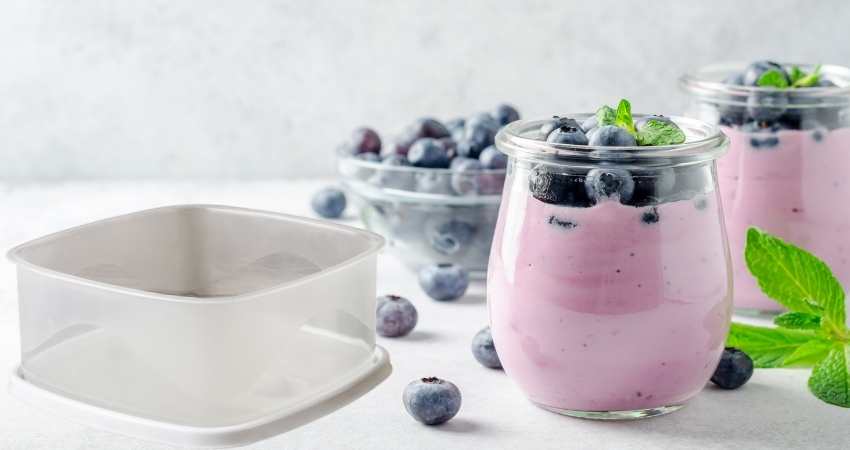Can You Store Blueberries in Tupperware?
Blueberries have a reputation of going bad quickly, especially if stored incorrectly. This leads to the question, can you store blueberries in Tupperware?
Blueberries can be stored in Tupperware, but only if the plastic container is stored inside the fridge. To remain fresh, blueberries need above average air circulation. Therefore, place blueberries in breathable or fridge-friendly Tupperware to keep them fresh when inside the fridge.
As a Certified Health Coach many people ask me about storing fruit, including blueberries. Also, I purchase and store them myself. Read on as we discuss the ways you can keep your blueberries fresher for longer.
Disclaimer: Some links in this article are affiliate links which means I may earn a small commission at no extra cost to you. As an Amazon associate I earn from qualifying purchases.

Storing Blueberries in Tupperware
Since there are different types of Tupperware, you’ll need to choose one that’s suitable for fruit storage. The 4 Pcs Tupperware Fridgesmart Container on Amazon is designed for the storage of fruits and vegetables in the fridge. It works by preventing moisture from seeping in and is tight enough to lock in just the right amount of air.
If you plan on using Tupperware to store your blueberries, you should place the container in the fridge immediately after you’ve put the berries inside.
Blueberries require proper air circulation to remain fresh. As a result, it is advisable to loosely cover your Tupperware if you must seal it1. Another vital storage tip is to avoid placing blueberries inside the crisper drawer due to poor air circulation2.
How Long Do Blueberries Last?
The average blueberry shelf life depends on when they were harvested and the storage techniques used. After being picked from the blueberry stem, these fruits can last on the shelf for around two to three days. However, blueberries will go stale faster if you live in a hot environment with low humidity levels.
Blueberries don’t do well when exposed to moisture, which explains why they should be rinsed only before consumption. But if you’re the type that must rinse fruits before storage, then you should dry blueberries completely to prevent mold growth.

Tips for Keeping BlueBerries Fresh While Stored
Check for Mold Before Purchasing Blueberries
Checking carefully before buying can help to increase the shelf life of your blueberries. Avoid berries that appear shriveled or moldy as they’re usually on the brink of rotting, so once you’ve selected your bunch of blueberries, rifle through the berries checking for mold and other rot signs3.
Mold is known to spread fast in blueberries, so don’t hesitate to toss berries that appear affected by mold. Separating the good blueberries from the bad ones will help to maintain freshness, ensuring that your berries have an extended shelf life.
Rinse Blueberries Only When Necessary
Rinsing blueberries encourages mold growth, which explains why you should only rinse when you plan to consume or use blueberries in a recipe. Rinsing blueberries isn’t advisable, especially if you plan to wait before consuming or using them in recipes.
Keep Your Blueberries As Dry as Possible
If the plan is to store your blueberries for several days to even weeks, then you’ll need to keep them as dry as possible. Be sure to dry them off properly after rinsing. The trick is to use paper towels to dry one berry at a time until you’re sure they’re all dry enough for storage, even in Tupperware.
Refrigerate Your Blueberries
Once you’ve placed your blueberries in a clean container, it’s time to put them in the fridge. The berries should maintain their freshness for up to a week or even more if well stored4. Remember to avoid sealing your containers completely since blueberries need proper air circulation to preserve their freshness.
Also, you should avoid placing the berries in the crisper drawer due to poor air circulation. Your berries will maintain their freshness provided they are stored in a cool, dry area with proper air circulation.
Freeze Overripe Blueberries
Storing overripe blueberries with the rest of the bunch will promote the production of ripening gases, and you don’t want that! Consider placing the excessively ripe blueberries (provided they don’t have mold) in the freezer. Frozen berries can last for up to six months if the freezer temperatures are consistently maintained.
To freeze blueberries, place them in a single layer on your baking pan so that they freeze individually. Once the berries are fully frozen, place them inside plastic freezer bags or a large enough container. The berries should be tightly sealed to maintain their freshness.
Some argue whether you should rinse them prior to freezing. I explain this in my blog post which you can check out right here, How to Freeze Blueberries.

If you have any questions to ask me about this article don’t hesitate to comment below or email us. You can find an email on our contact page.
Read Next – More Fruit Storage
Can You Store Blueberries and Strawberries Together?
Can You Store Blueberries and Strawberries Together?
Strawberries vs Blueberries: Which is Better? A Comparison
The 6 Best Vegetables To Go With Blueberries
Can You Store Blueberries and Strawberries Together?
How to Choose Good Blueberries: The Complete Guide
Do Organic Blueberries Have Worms?
- University of Nebraska Lincoln Extension: Blueberry [↩]
- Reader’s Digest: Here’s the Right Way to Use Your Refrigerator’s Crisper Drawer [↩]
- U.S. Highbush Blueberry Council: Buying Blueberries [↩]
- University of Kentucky: Kentucky Blueberries [↩]
